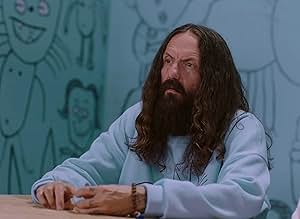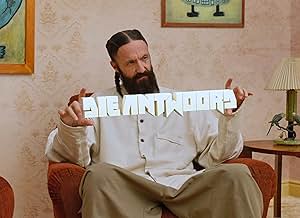La historia del controvertido grupo sudafricano Die Antwoord. Desde sus humildes comienzos hasta convertirse en un fenómeno mundial. Al igual que su música, el documental es impactante, prov... Leer todoLa historia del controvertido grupo sudafricano Die Antwoord. Desde sus humildes comienzos hasta convertirse en un fenómeno mundial. Al igual que su música, el documental es impactante, provocador, muy creativo y extrañamente divertido.La historia del controvertido grupo sudafricano Die Antwoord. Desde sus humildes comienzos hasta convertirse en un fenómeno mundial. Al igual que su música, el documental es impactante, provocador, muy creativo y extrañamente divertido.
Moonchild Sanelly
- Self - Artist
- (as Moonchild)
Ghostface Killah
- Self - Wu-Tang Clan
- (material de archivo)
Tokkie Jones
- Self - Adopted Son
- (material de archivo)
Opiniones destacadas
I saw Die Antwoord earlier this year in Brixton where they performed in a surprisingly tight venue for two packed nights. They presented 16 in between acts as some kind of angel figure and made a lot of effort to connect to the crowd to see how much rapport they still had. Ninja referred to the controversies in a rap bit about the homophobia accusations being off since their DJ is gay, and the best part in the doc is that he himself gets to clarify he did not want to hog the spotlight once the group became famous.
16 talks about her depression once her parents separated and is presented as the reason they got back together. I'm not sure what to think about her narration and the way she is used to hold the film together. The last frame is a clip of her as a toddler saying "Mommy my heart is fixed". But she is 18, old enough to make her own decisions. I hope.
Ninja and Yolandi talk in an excessively controlled and staged manner, that's not going to help to dispel the bad rep. Ninja's Jesus attire is way over the top. They mention the abuse allegations of their warden son Tokkie but he himself doesn't get to speak his piece. There is an envy narrative in rap music, told by black ZA artists in what feels like carefully staged PR. There is no comment on the sexual misconduct allegations against Ninja. It would have been appropriate to at least mention Zheanni since she reported him for assault and they can't perform in Australia because of that.
So all in all, this is a visually impressive PR piece to assist the comeback of the most wildly innovative act of the 2010s. But it doesn't comment on Waddy Jones' behavior which is OK if you think art and artist should be viewed separately. If you're a fan it's a nice companion piece, it you look for answers you won't find them here.
16 talks about her depression once her parents separated and is presented as the reason they got back together. I'm not sure what to think about her narration and the way she is used to hold the film together. The last frame is a clip of her as a toddler saying "Mommy my heart is fixed". But she is 18, old enough to make her own decisions. I hope.
Ninja and Yolandi talk in an excessively controlled and staged manner, that's not going to help to dispel the bad rep. Ninja's Jesus attire is way over the top. They mention the abuse allegations of their warden son Tokkie but he himself doesn't get to speak his piece. There is an envy narrative in rap music, told by black ZA artists in what feels like carefully staged PR. There is no comment on the sexual misconduct allegations against Ninja. It would have been appropriate to at least mention Zheanni since she reported him for assault and they can't perform in Australia because of that.
So all in all, this is a visually impressive PR piece to assist the comeback of the most wildly innovative act of the 2010s. But it doesn't comment on Waddy Jones' behavior which is OK if you think art and artist should be viewed separately. If you're a fan it's a nice companion piece, it you look for answers you won't find them here.
Didn't know anything about Die Antwoord before this. I don't particularly like their music although it does strike as being interesting and unique.
That said the visuals for this documentary are very striking and I'd probably are the main reason that would recommend watching this.
Some people seem to think this is merely a puff piece to offset the allegations made by 'Tokkie'. I don't know anything about that so cannot comment on it further. I would say that 'Ninja' looked particularly 'medicated' during the filming.
On the whole, I found this to be interesting and informative with enough artistic merit to warrant a recommendation.
That said the visuals for this documentary are very striking and I'd probably are the main reason that would recommend watching this.
Some people seem to think this is merely a puff piece to offset the allegations made by 'Tokkie'. I don't know anything about that so cannot comment on it further. I would say that 'Ninja' looked particularly 'medicated' during the filming.
On the whole, I found this to be interesting and informative with enough artistic merit to warrant a recommendation.
In the first 5 minutes Yolandi lies and says she was 19 when she met Ninja in 2001. Except that Wikipedia lists her birthdate as December 1, 1984. That means she was most likely 16 (or possibly 17 if they met in December) when she met Ninja. He would have been 26 or 27.
This "documentary" starts with a lie because the truth of Die Antwoord is too disgusting. Nothing after that lie can be trusted. This video is merely slick propaganda meant to rehabilitate their image. And they enlist their daughter, Sixteen, as their mouthpiece.
The visuals and editing are reminiscent of their music videos. Which is to say they are very stylistic and engaging. But this comes across as more of a long form commercial for Die Antwoord than a documentary.
This "documentary" starts with a lie because the truth of Die Antwoord is too disgusting. Nothing after that lie can be trusted. This video is merely slick propaganda meant to rehabilitate their image. And they enlist their daughter, Sixteen, as their mouthpiece.
The visuals and editing are reminiscent of their music videos. Which is to say they are very stylistic and engaging. But this comes across as more of a long form commercial for Die Antwoord than a documentary.
A documentary from last year detailing the rise of the titular rap duo, Ninja & Yolandi Visser, who hail from South Africa. Nominally presented by the duo's daughter Sixteen (named after Visser's favorite number), we follow the struggles of Ninja, who had the knack for rap but the record labels felt otherwise but once he hooked up w/Visser, both literally & romantically, the band took off w/their outre music videos & unique visual style even coming to our shores to present their particular vision to American audiences (further evidence of their influence came when both were cast in Neill Blomkamp's Chappie in 2015). The usual ups & downs of fame would also rear its head as the pair would separate (Ninja would take on multiple partners) but their love brought them back into each other's arms w/the denouement up in the air as to where the band will go next. Presented w/tongue firmly in cheek (the pair live on an animal preserve w/wild beasties running around w/o abandon), we never know if the presentation is an actual litany of facts or some performative extension of their persona & we'll never know since the pair are all but humorless but direct in their delivery. Being the doc is a pip to watch I think it's great the makers left it up to us to decide what's real or reel? Get guessing!
I became utterly fascinated with Yolandi & Ninja when they released their first album. Some of their darker visuals disturbed me, but their unique vision is so uninhibited & raw that it drew me in fully.
When I heard about the allegations levelled at them by Zheani, a rapper in her own right, things changed. Not to mention their adoptive son, Tokkie, coming out with his own disturbing experience living with them.
So here I was, ready to watch the documentary with an open mind and hear their side.... and... it's just a vanity project. Plain and simple. That's not to say director Jon Day didn't do a good job here. He infused the documentary with some very surreal and beautiful imagery, as well as showcasing their own artistry. HOWEVER, they focused too much on their failed relationship and only dedicated 3 minutes to address Tokkie's allegations against them in a way that felt so disingenuous and straight up victim-blaming (in my opinion anyway).
This documentary is a poorly executed attempt at image rehabilitation. Simple as that. And this is where Jon Day drops the ball. He didn't probe them enough, he just let them weave this tale of love lost and uses emotional music to drive the point of this documentary home.
Now I feel like there's no going back for them. This was the moment to show remorse, to accept the fact they have harmed people along their very chaotic rise and subsequent fall of their career.
I will always admire their artistic work, their Lynchian performance art, their one of a kind musical output, all of that. But this is their last hurrah. Their image is permanently stained by their highly disturbing behaviour. God bless and keep 16.t.
When I heard about the allegations levelled at them by Zheani, a rapper in her own right, things changed. Not to mention their adoptive son, Tokkie, coming out with his own disturbing experience living with them.
So here I was, ready to watch the documentary with an open mind and hear their side.... and... it's just a vanity project. Plain and simple. That's not to say director Jon Day didn't do a good job here. He infused the documentary with some very surreal and beautiful imagery, as well as showcasing their own artistry. HOWEVER, they focused too much on their failed relationship and only dedicated 3 minutes to address Tokkie's allegations against them in a way that felt so disingenuous and straight up victim-blaming (in my opinion anyway).
This documentary is a poorly executed attempt at image rehabilitation. Simple as that. And this is where Jon Day drops the ball. He didn't probe them enough, he just let them weave this tale of love lost and uses emotional music to drive the point of this documentary home.
Now I feel like there's no going back for them. This was the moment to show remorse, to accept the fact they have harmed people along their very chaotic rise and subsequent fall of their career.
I will always admire their artistic work, their Lynchian performance art, their one of a kind musical output, all of that. But this is their last hurrah. Their image is permanently stained by their highly disturbing behaviour. God bless and keep 16.t.
Selecciones populares
Inicia sesión para calificar y agrega a la lista de videos para obtener recomendaciones personalizadas
Detalles
- Fecha de lanzamiento
- País de origen
- Sitios oficiales
- Idioma
- También se conoce como
- ZEF История Die Antwoord
- Productoras
- Ver más créditos de la compañía en IMDbPro
- Tiempo de ejecución1 hora 30 minutos
- Color
Contribuir a esta página
Sugiere una edición o agrega el contenido que falta

Principales brechas de datos
What is the German language plot outline for ZEF: The Story of Die Antwoord (2024)?
Responda

































